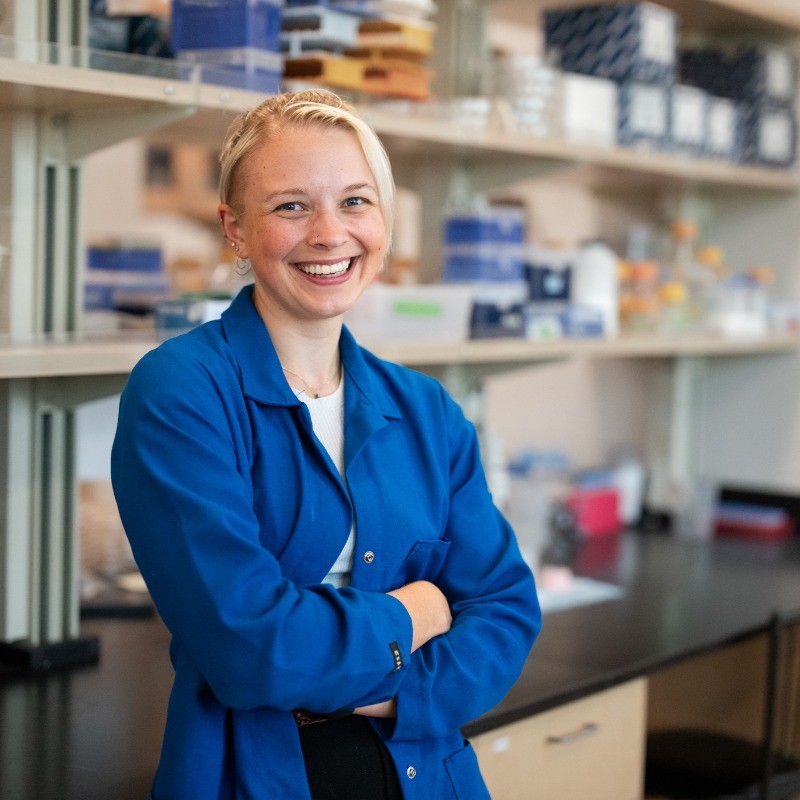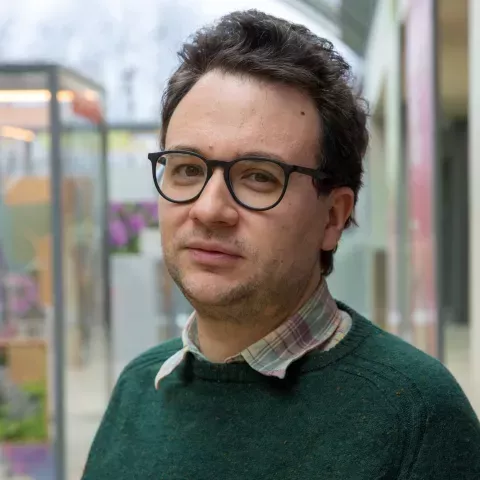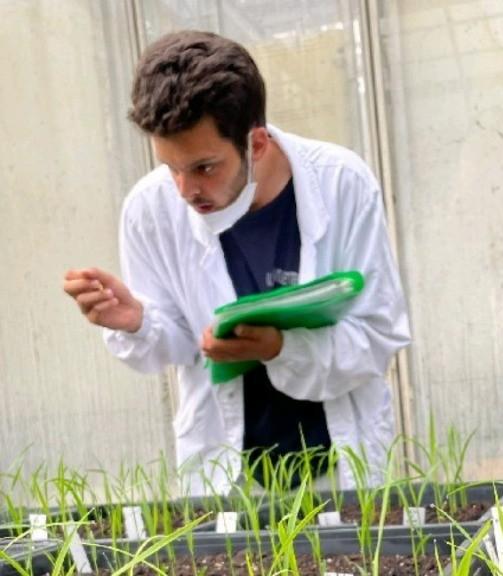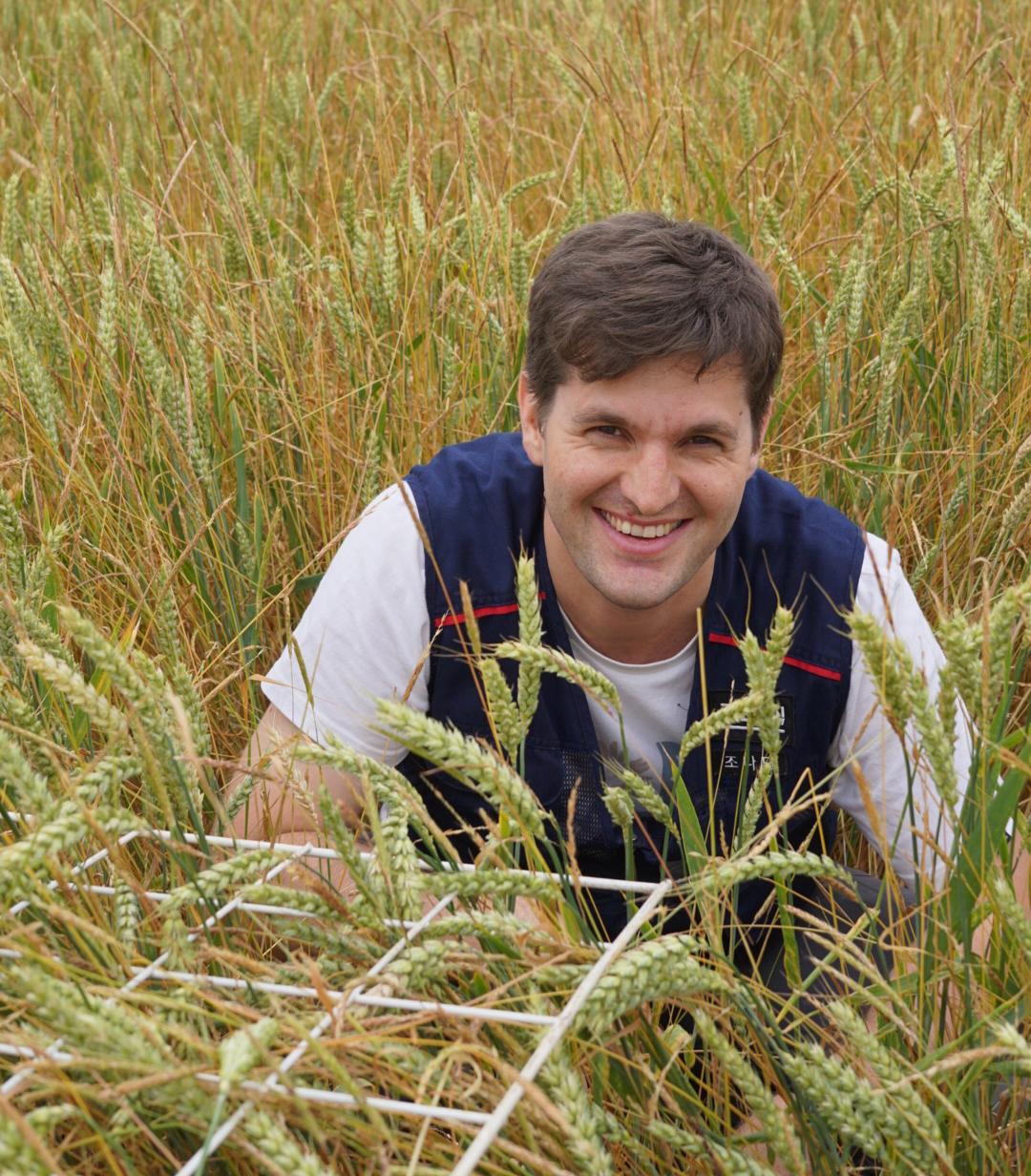Abstract:
Not available
Abstract:
Not available

About the presenter:
Adrian earned his Bachelor’s degree in Biology and his Master’s degree in Ecology and Evolutionary Biology from the University of Graz, Austria. During his studies, he focused on biodiversity, with a particular emphasis on insect diversity. His master’s thesis examined the impact of root-knot nematodes on the bacterial communities associated with tomato plants in Uganda and explored the potential of bacterial volatile organic compounds to prevent root-knot nematode infestations. Following his master’s studies, he was employed at the Austrian Centre of Industrial Biotechnology (ACIB), where he worked on optimizing microbial applications for seed treatment to control fungal pathogens, assessing antibiotic resistance in potential biocontrol agents, and studying the interactions between bacterial and fungal biocontrol agents both in vitro and in planta. He also conducted research on the microbial assembly processes in sugar beet, its dependence on soil microbiomes and the potential of vermicompost for suppressing phytopathogens. During his doctoral studies at the Institute of Environmental Biotechnology (UBT) at Graz University of Technology, his research centered on the interactions between soil, plant, and insect pest microbiomes and their implications for biological pest control. His work focus on biological control mechanisms, entomopathogens, and reciprocal host-insect-microbe adaptations. Since 2023, Adrian has been working as a postdoctoral researcher at UBT.
Abstract:
Biological control of seed-borne pathogens such as the bacterium Paracidovorax (formerly Acidovorax citrulli) offers a sustainable option for disease management. Questions remain, however, whether bacterial interactions can prevent initial seed infection from flowers, and whether arrival order (i.e. priority effects) impacts interaction outcomes. Here, we used a synthetic community (SynCom) experiment in commercial watermelon (Citrullus lanatus) to test the following questions: 1) does bacterial arrival order on stigmas impact pathogen transmission to seeds, 2) are there effects on seed quality, germination and seedling emergence, and 3) are there effects on microbiota composition in offspring seedlings? Through strain specific qPCR, we found that detection and copy abundance of the pathogen Paracidovorax citrulli was higher when inoculated before or concurrently with the SynCom compared to inoculations after other SynCom strains. Through seed/seedling phenotyping, we found that germination and seedling size were higher when Paraburkholderia phytofirmans was inoculated first during pollination. Finally, through amplicon sequencing of seedling shoots, we found that bacterial and fungal communities differed in diversity and composition between inoculation treatments. This initial data suggests that priority effects can impact floral transmission of bacteria to seeds, and that these effects can be transgenerational. Such findings have implications for the timing of seed inoculation with biocontrol or beneficial bacteria in agriculture.

About the presenter:
Gillian is an incoming Postdoctoral Researcher of Seed Microbiomes and Bioinformatics at the Leibniz Institute for Agricultural Engineering and Bioeconomy. As an NSF Graduate Research Fellow at the University of California-Davis, she studied the contribution of floral transmission of bacterial community assembly in immature seeds, as well as some processes affecting transmission success. She has expertise in applying synthetic community (SynCom) experiments, field and lab studies, and metacommunity ecology concepts to questions about seed microbiota. Additionally, she is broadly interested in the processes affecting seed microbiota assembly, community dynamics across seed development, and using seed microbes in plant conservation.
Abstract:
Recently we demonstrated that the seed microbiome of certain spinach (Spinacia oleracea) seed lots can confer disease suppression against Globisporangium ultimum damping-off (previously known as Pythium ultimum). We hypothesized that differences in the microbial community composition of spinach seed lots correlate with the levels of damping-off suppressiveness of each seed lot. Here, we show that a large proportion of variance in seed-associated bacterial (16S) and fungal (Internal Transcribed Spacer 1) amplicon sequences was explained by seed lot identity, while 9.8% of bacterial and 7.1% of fungal community variance correlated with disease suppression. More specifically, a higher relative abundance of basidiomycetous dimorphic yeasts such as Vishniacozyma, Filobasidium, and Papiliotrema and of the bacterial genus Massilia was a key feature of suppressive seed microbiomes. We suggest that the abundance of these genera is indicative of seed lot suppressive potential. Seed processing and treatment can become more targeted with indicator taxa being used to evaluate the presence of beneficial seed-associated microbial functions. This process, in turn, could contribute to the sustainable management of seedling diseases. Finally, this study highlights the ubiquity of yeasts in spinach seed microbiota and their potential beneficial roles for seed health. For more info, please see our recent paper.”

About the presenter:
Makrina is a Plant Biologist with a specialization in sustainable cropping systems. She started her PhD in July 2020 studying the role of the seed microbiome in seed health and seed resilience against pathogens. Makrina holds a BSc Hons in Biological Sciences (Plant Science) from the University of Edinburgh (UK), and a Plant Health Erasmus Mundus Joint Master Degree from the University of Goettingen (Germany) and the Polytechnic University of Valencia (Spain). She also completed a one year traineeship at the European Food Safety Authority (Italy) as part of the Pest Surveillance Working Group of the Plant Health team. Her academic interests include the seed microbiome, phytopathology, disease suppression, microbial ecology and sustainable approaches in agriculture, especially in relation to plant health.
Abstract:
Although evidence of antibiotic resistance spreading through the plant microbiome is growing, research on the antibiotic resistome in seeds, a key reproductive organ and food source, remains limited. We integrate findings from microcosm and field experiments to investigate how environmental factors, including long-term organic fertilization and elevated CO2, shape the seed resistome. We detected diverse antibiotic resistance genes (ARGs) and mobile genetic elements (MGEs) in seed endophytes, with organic fertilization enhancing their numbers and abundance, and further impacted the relative abundance of ARGs in progeny rhizosphere. Furthermore, elevated CO2 significantly increased seed ARG abundance, altered bacterial and fungal communities, and strengthened bacteria–fungi interactions, further influencing resistome dynamics. Structural equation models revealed that seed resistomes play a pivotal role in ARG transmission to progeny rhizosphere soils, emphasizing their potential as resistome reservoirs. These findings highlight the overlooked contribution of plant seeds to antibiotic resistance dissemination and underscore the need for further research on their role in microbial resistance evolution within agroecosystems and under climate change. For more info, please see our papers on organic fertilization and free-air CO2 enrichment.

About the presenter:
Xin-Yuan Li is a PhD candidate in the labs of Yong-Guan Zhu and Xian-Yong Lin at Zhejiang University, as well as a guest researcher in Gabriele Berg’s lab at Graz University of Technology. Her research explores how environmental factors shapes plant health through plant microbiome, with a focus on seed microbiome and resistomes. Her long-term goal is to investigate how the assembly of seed microbial community is influenced by environmental factors, especially in the context of long-term climate change, and their implications for plant health and sustainable agriculture.
Abstract:
Seed germination critically determines successful plant establishment and agricultural productivity. In the plant holobiont’s life cycle, seeds are hubs for microbial communities’ assembly, but what exactly shapes the holobiont during germination remains unknown. Here, 16S rRNA gene amplicon sequencing characterized the bacterial communities in embryonic compartments (cotyledons and axes) and on seed coats pre- and post-germination of four soybean (Glycine max) cultivars, in the presence or absence of exogenous abscisic acid (ABA), which prevented germination and associated metabolism of seeds that had imbibed. Embryonic compartments were metabolically profiled during germination to design minimal media mimicking the seed endosphere for bacterial growth assays. The distinction between embryonic and seed coat bacterial microbiomes of dry seeds weakened during germination, resulting in the plumule, radicle, cotyledon, and seed coat all hosting the same most abundant and structurally influential genera in germinated seeds of every cultivar. Treatment with ABA prevented the increase of bacterial microbiomes’ richness, but not taxonomic homogenization across seed compartments. Growth assays on minimal media containing the most abundant metabolites that accumulated in germinated seeds revealed that seed reserve mobilization promoted enrichment of copiotrophic bacteria. Our data show that seed imbibition enabled distribution of seed-coat-derived epiphytes into embryos irrespective of germination, while germinative metabolism promoted proliferation of copiotrophic taxa, which predominated in germinated seeds. For more info, please see our paper.

About the presenter:
Davide is a Post-doc in Kew Science in the UK, and is interested in seed redox biology with emphasis on antioxidants in longevity and germination. He is particularly interested in seed metabolic resumption during germination and ageing, and seed-microbe interactions alongside storage, germination, and early seedling growth.
Abstract:
Not available

About the presenter:
Itumeleng is a plant scientist and PI of the Plant Holobiont Lab at Stellenbosch University, his work focuses on understanding which assembly processes are delimiting the plant holobionts, as well as the evolutionary history of niche shifts and stability. He is particularly interested in understanding how plant holobionts are assembled and maintained, and the hologenome theory of evolution.
Abstract:
Rice bakanae disease, caused by Fusarium fujikuroi, nowadays represents the main threat for rice seed producers. With recent European guidelines progressively reducing the use of chemical fungicides, new disease management strategies are urgently needed. The plant endosphere constitutes a source of potential microbial biocontrol agents (BCAs) against fungal pathogens. Endophytic antagonists, with their close association with the host, are more likely to withstand harsh field conditions, the main bottleneck of BCAs selection. This represents the first report of E. layuense, E. catenisporum, M. testaceum and M. oryzae strains with biocontrol potential against F. fujikuroi as promising biological seed dressing alternatives to chemical fungicides. For more info, please see our recent paper.

About the presenter:
Simone is a PhD candidate in University of Turin in Italy working on integrated strategies for sustainable rice plant protection against fungal pathogens Pyricularia oryzae and Fusarium fujikuroi, such as the selection of biocontrol agents among rice endophytes, field monitoring and population studies of P. oryzae.
Abstract:
Not available

About the presenter:
Logan is a PhD candidate in INRAE in France, and is interested in plant microbiome engineering of rapeseed to develop biocontrol solutions against the seed-transmitted pathogen Alternaria brassicicola. He uses floral, fruit or seed inoculations of mixed synthetic communities composed of bacteria, yeast and filamentous fungi to limit the transmission and impact of this plant pathogen.
Abstract:
The microbial communities associated with seeds, known as seed microbiota, are involved in seed germination, seedling emergence, and seedling health. Understanding the assembly, composition, and function of seed microbiota is therefore essential for optimizing agricultural practices and increasing crop productivity. Recent advances in seed microbiota engineering allow the manipulation of seed microbiota to better understand the role of selected strains and representative microbiota on seed germination, seedling emergence and seedling phenotype. The seed microbiota is a low-diversity community with dominant strains found across multiple species and agricultural conditions. Here, we evidence the role of bean seed natural microbiota in seed germination and seedling emergence ability across eight genotypes grown in field conditions and identify bacterial (Microbacteriaceae, Rhizobiales, Pseudomonadaceae) and fungal taxa (Leotiomycetes, Dothideomycetes, Sordariomycetes) associated with seed emergence potential. Then, using synthetic communities inoculations, we confirm the influence of seed-borne microorganisms and soil-dependent effect of seed inoculation on seedling phenotypes. We show associations between seed or seedling microbiota and specific plant metabolites at different early developmental stages likely involved in plant-microbe interactions. Ultimately, this approach could be used to design and inoculate synthetic microbiota based on desired plant phenotype traits, such as resistance against phytopathogens.

About the presenter:
Louna is a PhD candidate in INRAE in France, and is interested in interactions between seed and its microbiota, and its impact on plant germination, emergence, and tolerance to soil-borne phytopathogens. She is particularly interested in explore the seed microbiota effect on seedling metabolome and phenotype, to assess the effect of plant genotype in those interactions, and to evaluate seed microbiota potential for biocontrol against Pythium ultimum, a phytopathogen oomycete causing damping-off.
Abstract:
While often disregarded and not as well understood as microbe-root or microbe-shoot interactions, microbe-seed interactions can have important impacts on plant health. Weed seed persistence in the soil seed bank depends on dormancy, longevity and defence as key traits. Although it is generally understood that soil microorganisms contribute to weed seed decay, clear and strong relationships and mechanisms are largely unknown. It is posited that certain soil management practices increase the rate of weed seed decay by microbial activity, but neither specific microbial species nor practical strategies have been rigorously studied or confirmed. While there is some research on soil microbial effects on weed seeds, few (if any) studies have investigated how innate seed microbiomes may modulate persistence in the soil seed bank. Our experimental work in collaboration with Syngenta (UK, USA, Switzerland) as industrial partner aims to deliver an improved understanding of how soil and seed microbiomes are formed and their potential to affect weed seed persistence in distinct agricultural practices. A model, based on observations, to predict seed decay and germination and, by extension, improve weed management will be proposed.

About the presenter:
Jonathan is a PhD candidate in the Seed Science and Technology Research Group at Royal Holloway, University of London, studying the effects of soil microbiological communities on the longevity of blackgrass (Alopecurus myosuroides) seeds in the soil seedbank. His studies are funded by the London Interdisciplinary Biosciences Consortium Doctoral Training Partnership (LIDo) with Syngenta AG supporting as an industry partner.
Abstract:
Seeds provide a unique environment shaped by co-evolutionary processes, hosting diverse microbial communities. While metagenomic studies have uncovered an extended diversity of microorganisms, culture-based approaches remain crucial for understanding microbial potential and functional interactions. However, the factors influencing microbial culturability within seeds are not well understood. Our findings highlight the limitations of culture-based methods in capturing the full microbial diversity of Cannabis seeds and emphasize the importance of microbial interactions in determining culturability. A strong network connectivity within uncultured bacteria suggests that interdependencies and competition within the seed microbiome may have a role hindering isolation of key bacterial groups. These insights provide a framework for refining cultivation strategies to recover ecologically significant microbes with potential agricultural applications.

About the presenter:
Carolina is a PhD candidate at the Institute of Environmental Biotechnology, Graz University of Technology. Her research explores how plant-microbe interactions influence plant fitness and health, with a focus on seed microbial communities. She investigates the factors shaping microbiome composition and function, with the broader goal of identifying beneficial microbes that could be leveraged for sustainable crop improvement.
Abstract:
Flower-sourced assembly of seed microbiota remains an understudied ecological process. Here, we investigated the floral transmission pathway for bacterial acquisition by developing seeds of watermelon (Citrullus lanatus). Comparison of stigma- and seed-associated bacterial communities from field-grown C. lanatus revealed significant overlap: up to 40% of the bacterial diversity that was detected in seed was also found on stigmas. In a field pollinator exclusion experiment, honeybee visitation to flower stigmas had no significant effect on bacterial community composition in seeds. Among a collection of bacterial isolates from stigmas and seeds in the field, more than half (57%) were able to transmit to seeds after inoculation onto stigmas under laboratory conditions. Interestingly, for most bacterial strains, fruit set rates increased after floral inoculation, and in some cases even in the absence of transmission to the seed. We also found that bacterial isolates from watermelon stigmas and seeds had variable (i.e. positive or negative) effects on seed germination and seedling emergence. Our findings highlight the contribution of floral transmission to seed microbiota assembly and its consequences for plant fitness. For more info, please see our preprint on BioRxiv.

About the presenter:
Gillian is an ecology PhD candidate in the labs of Johan Leveau and Rachel Vannette at UC Davis, as well as a visiting graduate researcher with the EmerSys team at INRAE-IRHS. She is particularly interested in how various processes can contribute to microbial transmission between floral stigmas and developing seeds across spatial scales. In the long-term, she aims to study microbial community assembly processes across the seed life cycle, document the microbial diversity of seed communities, and relate assembly outcomes to seedling health. She is an NSF Graduate Research Fellow and a UC Davis Dean’s Distinguished Graduate Fellow.
Abstract:
Not available

About the presenter:
Itumeleng is a plant scientist and PI of the Plant Holobiont Lab at Stellenbosch University, his work focuses on understanding which assembly processes are delimiting the plant holobionts, as well as the evolutionary history of niche shifts and stability. He is particularly interested in understanding how plant holobionts are assembled and maintained, and the hologenome theory of evolution.
Abstract:
Species’ distributions and abundances are shifting in response to ongoing global climate change. Mutualistic microbial symbionts can provide their hosts with protection from environmental stress that may contribute towards resilient responses to environmental change, however these changes may also disrupt species interactions and lead to declines in hosts and/or symbionts. Symbionts preserved within natural history specimens offer a unique opportunity to quantify changes in microbial symbiosis across broad temporal and spatial scales. We asked how the prevalence of seed-transmitted fungal symbionts of grasses (Epichloë endophytes) have changed over time in response to climate change, and how these changes vary across host species’ ranges. Our results provide novel evidence for a cryptic biological response to climate change that may contribute to the resilience of host-microbe symbiosis through context-dependent benefits that confer a fitness advantage to symbiotic hosts under environmental change. For more info, please see our preprint on BioRxiv.

About the presenter:
Joshua is a PhD candidate member of the Miller Lab at Rice University in the USA. He is a quantitative ecologist studying how interactions with microbes impact the distribution and demography of plants in a changing world.
Abstract:
Bacteria associated with plants can enhance the plants’ growth and resistance against phytopathogens. Today, growers aim to reduce the use of mineral fertilizers and pesticides. Since phytopathogens cause severe yield losses in crop production systems, biological alternatives gain more attention. Plant and also seed endophytes have the potential to influence the plant, especially seed-borne bacteria may express their beneficiary impact at initial plant developmental stages. In the current study, we assessed the endophytic seed microbiome of seven genetically diverse barley accessions by 16S rRNA gene amplicon sequencing and verified the in vitro plant beneficial potential of isolated seed endophytes. Furthermore, we investigated the impact of the barley genotype and its seed microbiome on the rhizosphere microbiome at an early growth stage by 16S rRNA gene amplicon sequencing. Although barley accessions representing high genetic diversity displayed a genotype-dependent endophytic seed microbiome, a core seed microbiome with high relative abundances was identified. Endophytic isolates were affiliated to members of the core seed microbiome and many of them showed plant beneficial properties. We propose therefore that new breeding strategies should consider genotypes with high abundance of beneficial microbes. For more info, please see our paper.

About the presenter:
Nina is a postdoctoral researcher in the Graz University of Technology in Austria, working on the seed microbiome of barley and oilseed rape, as well as on the barley microbiome and its ability to enhance plant immunity. She is also interested in rhizosphere microbiome transplants and the impact of agricultural practices on the rhizosphere microbiome.
Abstract:
Seed endophytes have a significant impact on plant health and fitness. They can be inherited and passed on to the next plant generation. However, the impact of breeding on their composition in seeds is less understood. Here, we studied the indigenous seed microbiome of a recently domesticated perennial grain crop (Intermediate wheatgrass, Thinopyrum intermedium L.) that promises great potential for harnessing microorganisms to enhance crop performance by a multiphasic approach, including amplicon and strain libraries, as well as molecular and physiological assays. Overall, this study advances our understanding of the assembly and transmission of endophytic seed microorganisms in perennial intermediate wheatgrass and highlights the importance of considering the plant microbiome in future breeding programs. For more info, please see our recent paper.

About the presenter:
Kristina is a PhD candidate at Graz University of Technology in Austria.
Abstract:
Seed is a critically important basic input of agriculture, because sowing healthy seeds is essential to food production. Using high quality seed enables less use of synthetic pesticides in the field. Seedborne pathogens can reduce yield quantity and quality of the crops produced. Seed treatments protect plant seedlings from pathogen attacks at emergence and at the early growth stages, contributing to healthy crop plants and good yield. However, there is increased concern about the application of synthetic pesticides to seeds, while alternatives are becoming increasingly addressed in seedborne pathogen research. A series of strategies based on synthetic fungicides, natural compounds, biocontrol agents (BCAs), and physical means has been developed to reduce seed contamination by pathogens. The volume of research on seed treatment has increased considerably in the past decade, along with the search for green technologies to control seedborne diseases. This review focuses on recent research results dealing with protocols that are effective in the management of seedborne pathogens. Moreover, the review illustrated an innovative system for routine seed health testing and need-based cereal seed treatment implemented in Norway. For more info, please see our recent paper.

About the presenter:
Marwa is a postdoctoral researcher of plant pathology at the Marche Polytechnic University (UNIVPM) in Italy. She received a PhD in 2020 from two universities: the National Agricultural Institute of Tunisia (INAT) and UNIVPM, with a very honorable mention in plant protection. Her research focus on detection and morphological and molecular identification of seed-borne fungi on cucurbits. She also studied seed transmission of the main diseases of cucurbits (e.g., Stagonosporopsis cucurbitacearum) and their control using essential oils and chitosan. She is a member of the Italian Phytopathological Society (SIPaV) and the American Phytopathological Society (APS), and is a member of the ISPP Seed Pathology Committee.
Abstract:
Quinoa is a promising crop for food security, due to its high nutritional content and adaptation to climate change. Most of the world yield comes from Peru and Bolivia and is exported to the US to produce manufactured food supplements. However, some regions in Peru are polluted with cadmium and quinoa grains absorb toxic quantities. The main objective of this project is to identify how cadmium changes the bacteria and fungi found inside the quinoa grains and if those microorganisms could have beneficial activities to decrease cadmium concentration in quinoa and final consumersʼ uptake. Microbes were isolated in vitro to assess biochemical activities which are beneficial to plant growth and decrease cadmium concentration in grains and tested in quinoa plants to assess a new approach to decrease cadmium pollution and produce healthier quinoa crops.

About the presenter:
Cristián is a PhD candidate in ecological sciences and engineering (ESE) at Purdue University, in the Dr. Hoagland Soil Microbial Ecology Lab. He works in plant microbiome and the effect of the environment on microbial composition and functions. He focus on studying the effect of crossing on the tomato seedborne microbiome and the induced systemic resistance via beneficial microorganisms.